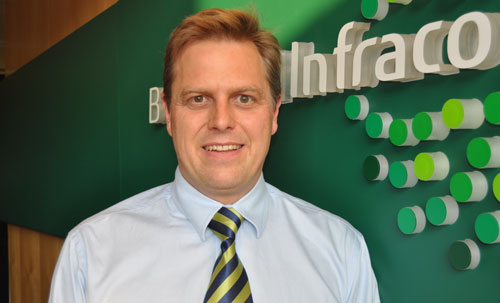
State-owned telecommunications infrastructure company Broadband Infraco has had a tough few months. But acting CEO, Andrew Shaw, reckons the company is getting itself sorted out and will make a meaningful impact on SA’s telecoms industry.
The company was established by former public enterprises minister Alec Erwin, who was frustrated at the slow pace at which his cabinet colleague, communications minister Ivy Matsepe-Casaburri, was dealing with the lack of competition to Telkom. Erwin felt the state needed to step in to provide a national and international fibre alternative to the fixed-line incumbent.
Since then, though, the market has become significantly more competitive, with big private-sector operators all making substantial investments in fibre systems.
Shaw won’t say whether he believes Infraco still has a role as a state-owned enterprise, arguing that’s a decision government has made, but he says the company can play an important role in the sector. “It’s not my call, but there is a huge strategic national advantage in Infraco.”
However, Shaw says he would like Infraco to be much more closely aligned with the private sector, helping operators with their infrastructure needs.
“We have a hugely strong infrastructure story to sell,” says Shaw, who has been in the CEO role in an acting capacity since mid-March following the sudden departure of founding CEO Dave Smith.
Shaw says Infraco has taken a number of steps to fix poor processes, especially in the procurement department where tenders were awarded without the company following the stringent requirements of the Public Finance Management Act. He says these problems have now been addressed.
“What happened was Infraco grew from a small business to a medium-sized business very quickly and all the spaces were not necessarily being watched,” Shaw says. “The focus was on the roll-out of infrastructure, getting the network up and running, and meeting customer requirements.”
Shaw, who was previously acting director-general at the department of public enterprises, was deployed to Infraco by public enterprises minister Malusi Gigaba. “He asked me to step in to stabilise the company, find out where the challenges are, get rid of the rot, get a clean audit, build the company, and work with the private sector.”
Though he admits the market has become “highly competitive”, he says government has made it “very clear” the company has to be self-reliant. “There are no bail-outs in the state-owned enterprises space any longer,” he says. “That money can be better used elsewhere, so there is no way we can take our begging bowl and stand in line for money. We will have to cross-subsidise the requirements under our mandate with commercial business.”
Recently, senior government officials have made noises about the possibility of merging Infraco with another state-owned enterprise, broadcasting signal distributor Sentech. The department of communications wants Sentech to build a wireless broadband network in rural areas, which could be complemented by Infraco’s national and metropolitan fibre network.
Although Shaw says Infraco has held discussions with Sentech about how the companies could collaborate, he has not been party to any discussions about a merger. “That’s something between ministers,” he says. “Both ministers have asked the two organisations to begin working more closely together and we are pursuing a lot of initiatives to roll out government services.”
Infraco has about 12 000km of fibre in the ground. It will extend that network in the next few years, building fibre rings to provide for redundant routes. It also plans to build more points of presence closer to its customers. — Duncan McLeod, TechCentral
- Subscribe to our free daily newsletter
- Follow us on Twitter or on Facebook




